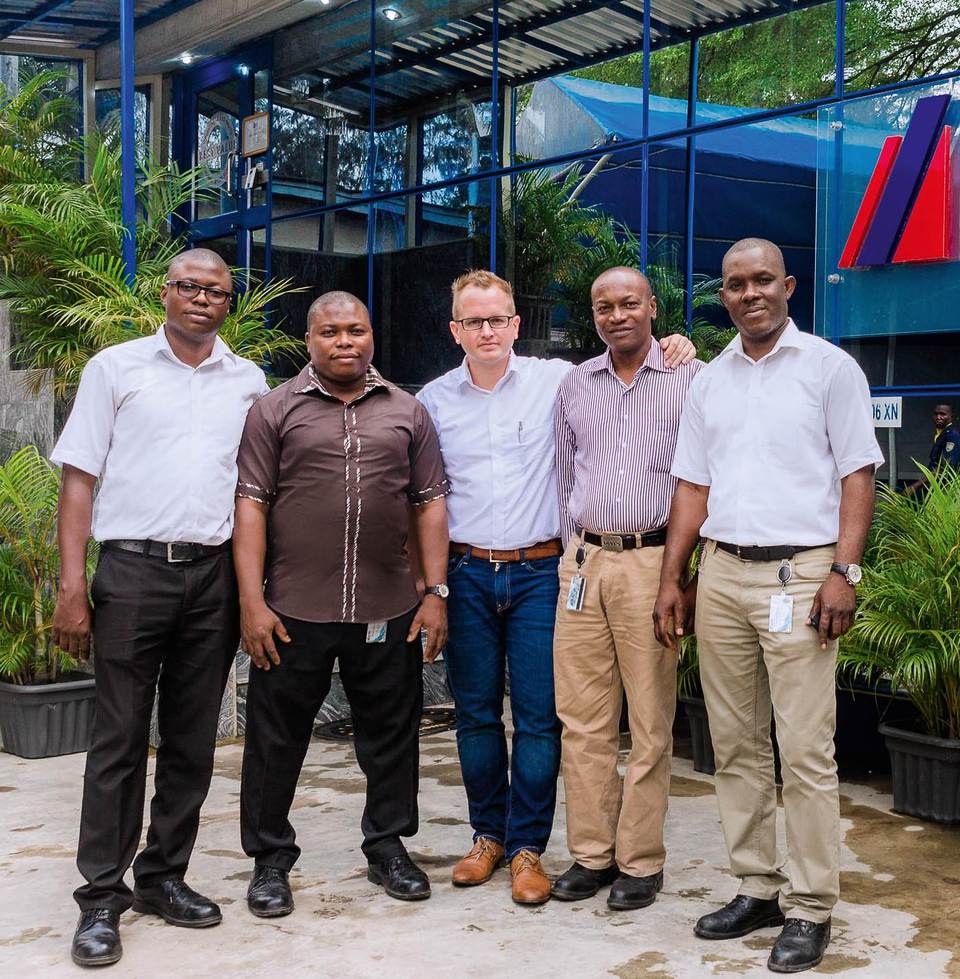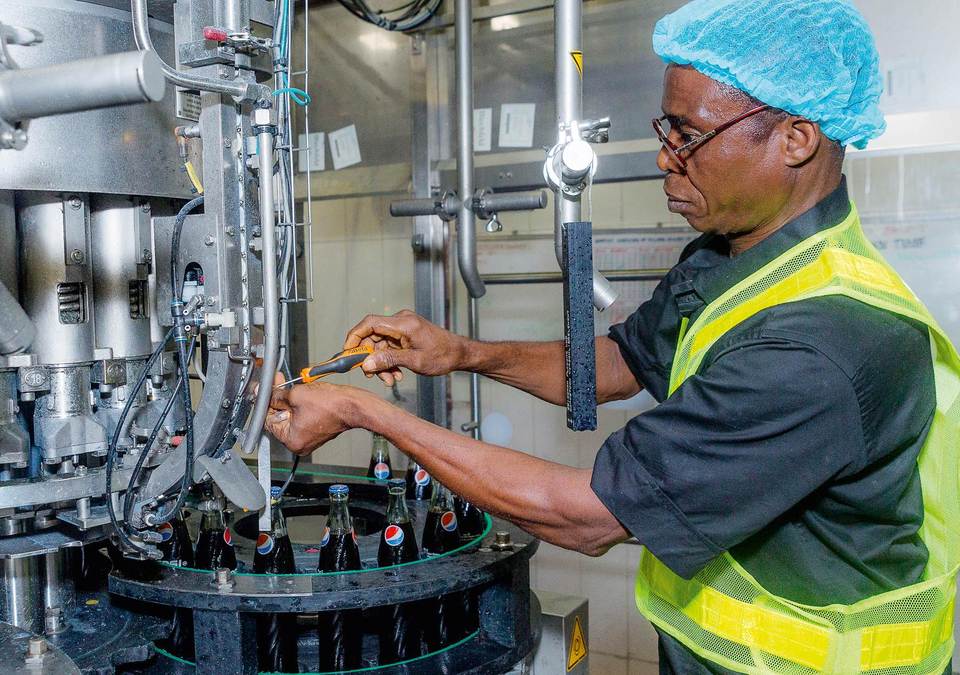Alexander Fuchs has been working as an electronics engineer for KHS Machines Nigeria in Lagos for six years now. Since 2013 the 31-year-old service and spare parts manager has been responsible for service here in the region of West Africa. The service point was launched here fourteen years ago by three engineers – all of them from Germany. Fuchs now heads a team of 31 electronics and automotive engineers and mechanics – with just one of them a German. This is a development Michael Kloss is also very pleased with. Kloss is managing director of the West African branch of KHS which now numbers almost 70 employees. “Alexander is the right man in the right place. Thanks to his commitment we’ve become much faster and much more flexible. Our local service staff feel much more committed to us than they used to be and are extremely motivated in their work.” This development is primarily down to the intensive training measures KHS implements to prepare its engineers worldwide for their assignments with customers. “In 2016 we’ve held a total of 250 days of training for our Nigerian team. We’re on the right track,” states Kloss.
Discerning recruitment process
Alexander Fuchs was well aware of the fact that the massive development and qualification of the local team in such a short space of time would be a challenge in Nigeria. The sheer volume of applications triggered by a job offer from KHS surprised him, however. “There are about 5,000 applicants for each position. We also see academically trained HR managers applying for jobs as mechanics, for example. Following initial selection we invite up to 70 people to take a recruitment test and then hold about 20 interviews.” It’s still not easy to find suitable expert personnel. “In 2015 we wanted to hire four electronics engineers. We ended up with just three. At the end of the day, however, our selection process proved its worth; the people we ultimately opt for are so good that we can send them out to the customer after just a short briefing,” Fuchs explains.

Yet another difficulty is getting employees to stay with the company in the long term, as managing director Michael Kloss outlines. “In Nigeria, for many employees what they earn is more important than their loyalty to their employer.” However, it’s not so easy for less privileged workers, Kloss admits, and names the journey to work – which often takes two hours or more – by way of example. What’s chiefly important here, therefore, is fair treatment and a willingness to listen in order to boost employee satisfaction.
Regionalization strategy
Nigeria is a good example of the further development of KHS service at locations all over the world as pursued by KHS with its service strategy. This is something Jörg Beckmann, head of Service Sales and Field Service Coordination at KHS in Dortmund and Hamburg, also believes in. “One central aspect of our service concept for 2020 is regionalization. To this end, we’re considerably expanding both the number and scope of our local offices and bringing the machine expertise in the regions up to a level which more than satisfies our customers.” The concept also aims to generate less unproductive travel time incurred to date by engineers traveling to often remote destinations. “Firstly, this cuts costs and secondly, it drastically reduces our response time to customer requests,” Beckmann states – an issue which is all the more important in a country like Nigeria where travel in general is more difficult.
“Friendly relations and good networks are more important here than in other places.”
In order to also increasingly shift the processing of spare parts to regional branches of the company, a local system of order management is to be established or expanded if already in place. Central office is moving project management tasks to the branch offices, thus enabling a more independent form of work without KHS in Germany having to constantly intervene. Service level agreements can be implemented in the various countries without the need for any further control from KHS headquarters. “Thanks to our qualified local presence we can offer credible holistic maintenance concepts from the region for the region,” notes Beckmann.
Alexander Fuchs in Lagos can confirm this. As one element of its service level agreements KHS engineers, who spend the majority of their time at work on customer sites, are a major factor in the successful cooperation with KHS’ biggest customers. One of these is Paul Eyatare Omowa who has been working for KHS as a mechanical engineer for four years. “It’s my job to implement our standards in preventive maintenance and teach all line and machine operators what they need to know,” Omowa explains. “As an interface between KHS and the customer I help to give the customer reliable service in the long term.”

Rapid success
With great success, as the example of the Seven Up Bottling Company in Lagos, a licensed bottler of PepsiCo International, illustrates. The customer wanted to shut down the blowout function on its filler to remove residual product as this had a high CO₂ consumption – without then having to put up with frequent foaming. By installing a throttle with a smaller orifice into the return gas tubes of the filling elements KHS Service was able to quickly master this challenge. “The result was a considerable saving in CO₂,” smiles Sudhir Hegde, general manager at Seven Up, who, when working with the experts at KHS, especially values the fact that uncomplicated results and solutions are found quickly and flexibly.
Another of Alexander Fuchs’ tasks is to develop local service concepts – such as an on-going service for machine components where the parts are collected from the customer and overhauled on KHS premises. “This will then reduce the effort for yearly maintenance from the previous ten to five days,” the service manager estimates. “We’re developing packages here which are tailored to suit local requirements. Customers like to be led by the hand – and this can be taken quite literally,” he says, describing one aspect of the regional mentality. Michael Kloss agrees. “Friendly relations are more important here than in other places.” The 47-year-old knows what he’s talking about; he’s been in Lagos for KHS for twelve years now. Together with Fuchs, Kloss also has great plans for the future. In the next three years they want to add an extra twenty engineers to their team and open more service points in Congo and Ghana, for instance. They’re not alone in this, as Kloss emphasizes. “We have a fantastic team here where everyone does their bit – whether they’re a local employee or one of our German colleagues. Not everybody wants to come to Nigeria – which is most definitely not your classic holiday destination. But those who do have good chances of development and can prove themselves for greater challenges. We all grow with our jobs,” he concludes.
Your contact on this topic
Alexander Fuchs
Manager of Service and Spare Parts
KHS Machines Nigeria Ltd.
Phone: +234 163 12470
Email: alexander.fuchs@khs.com
Michael Kloss
Managing director
KHS Machines Nigeria Ltd.
Phone: +234 163 12460
Email: michael.kloss@khs.com




















